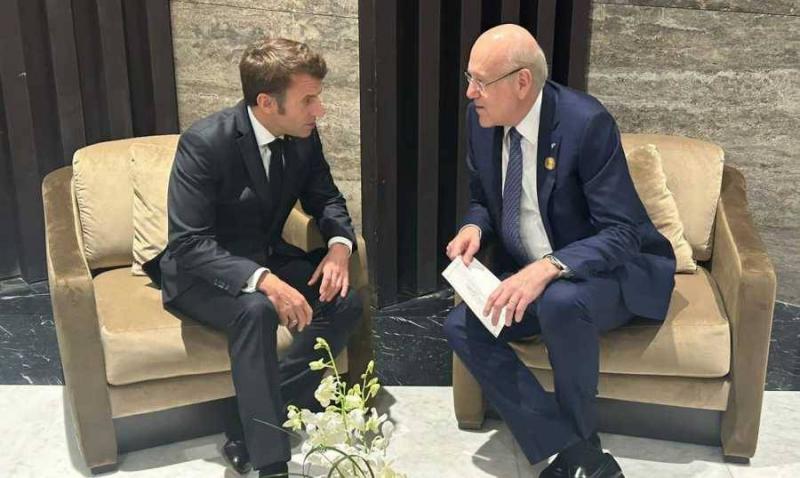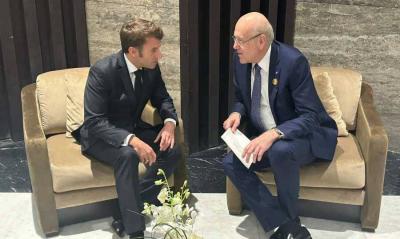In Lebanon, discussions are ongoing about the perceived failure of the Paris meeting, suggesting that it did not yield "consensual" outcomes among the delegations of the five countries. However, this view may not be entirely accurate for several reasons. Firstly, sources closely following the situation state that an agreement on the meeting's main outlines and results had already been reached before it took place. Had those prerequisites not existed, the delegations might not have attended. Additionally, the meeting's agenda was discussed in the French Foreign Minister's meeting with Saudi Crown Prince Mohammed bin Salman, which facilitated the scheduling of the meeting and instructed the Saudi delegation to head to Paris. Moreover, there were prior consultations among the five countries leading up to the meeting, focusing on a realistic approach to the Lebanese crisis to achieve a solution without provoking any party.
In Beirut, various narratives are shared regarding a "division" among the delegations. Some consider that Saudi Arabia, Qatar, and the United States stood on one side, while France and Egypt were on another. Others argue that Saudi Arabia and the United States were on one side against the other three countries. However, following sources deny these classifications, stating that avoiding these disagreements was possible by not delving into details and names, leaving such matters to the Lebanese themselves. Consequently, what was aimed for was to outline a broad roadmap for political and economic action that the Lebanese should follow to resolve their crisis and to secure external support and encourage international countries to engage and contribute.
Had the delegations entered into intricate details and sought to adopt specific names or similar matters, conflict might have arisen, but this was avoided. It is true that five minds were at the table, each favoring a different approach; however, that was not the subject of the discussion. Though differences in the Saudi and French positions had emerged previously due to multiple leaks about Paris trying to suggest names to Riyadh—which was rejected—both parties managed to issue joint statements even in the face of differing approaches, as seen in the statement from the meeting between French President Emmanuel Macron and Saudi Crown Prince or the joint statement from the U.S., France, and Saudi Arabia in New York during the UN General Assembly meetings.
On the Arab front, Saudi Arabia discussed its vision for a Lebanese solution with Qatar and Egypt, as well as with Gulf Cooperation Council countries, during Saudi Crown Prince's tour of the Gulf states months ago and in issuing aligned positions regarding Lebanon, including the Kuwaiti paper. Likewise, discussions with Egypt resulted in a statement about the Lebanese file following talks between the two countries' foreign ministers during Egyptian Foreign Minister Sameh Shoukry's visit to Riyadh.
Practically, the discussions from the Paris meeting revolved around these points, amid indications suggesting that the approaches were rational, focusing on the necessity of reaching a settlement that differs from previous ones. Sources reiterate the basic tenets for any solution to the Lebanese crisis: adherence to the Taif Agreement, fulfilling constitutional entitlements including the election of a President and the formation of a government that enjoys international confidence, fighting corruption, and establishing a comprehensive economic reform plan.
The delay in issuing a statement from the quintet meeting or from the French Foreign Ministry caused much speculation, prompting observers to point to the absence of a statement as evidence of the meeting's failure or lack of consensus. However, following sources clarify that the delay was due to each delegation needing to communicate the discussions' content to their capital for coordination. Paris is tasked with continuing discussions with Lebanese officials and keeping them informed of what transpired. This approach has effectively passed the ball to the Lebanese court to proceed toward achieving a settlement and consensus. Both Paris and Qatar are expected to play a significant role in facilitating this agreement. Should positive results be achieved, another meeting will be convened, either at the same level or a higher one.
In the context of Saudi-Iranian dialogue, it is currently unwise for anyone in Lebanon to rush to express opinions. It is essential to wait for what the Lebanese parties will convey. Concurrently with the French meeting, Saudi discussions were held with Yemeni delegations from Sanaa to reach a settlement. This is combined with positive attempts to revive Saudi-Iranian dialogue amid mutual messages between the two sides, with Qatar also playing a crucial role in this regard. All these files could positively impact the Lebanese situation, but this requires more time, and no party is likely to fully lay all its cards on the table or discard a nomination or cling to a nomination, pending advanced negotiations regarding the mechanisms of forming and producing authority.




